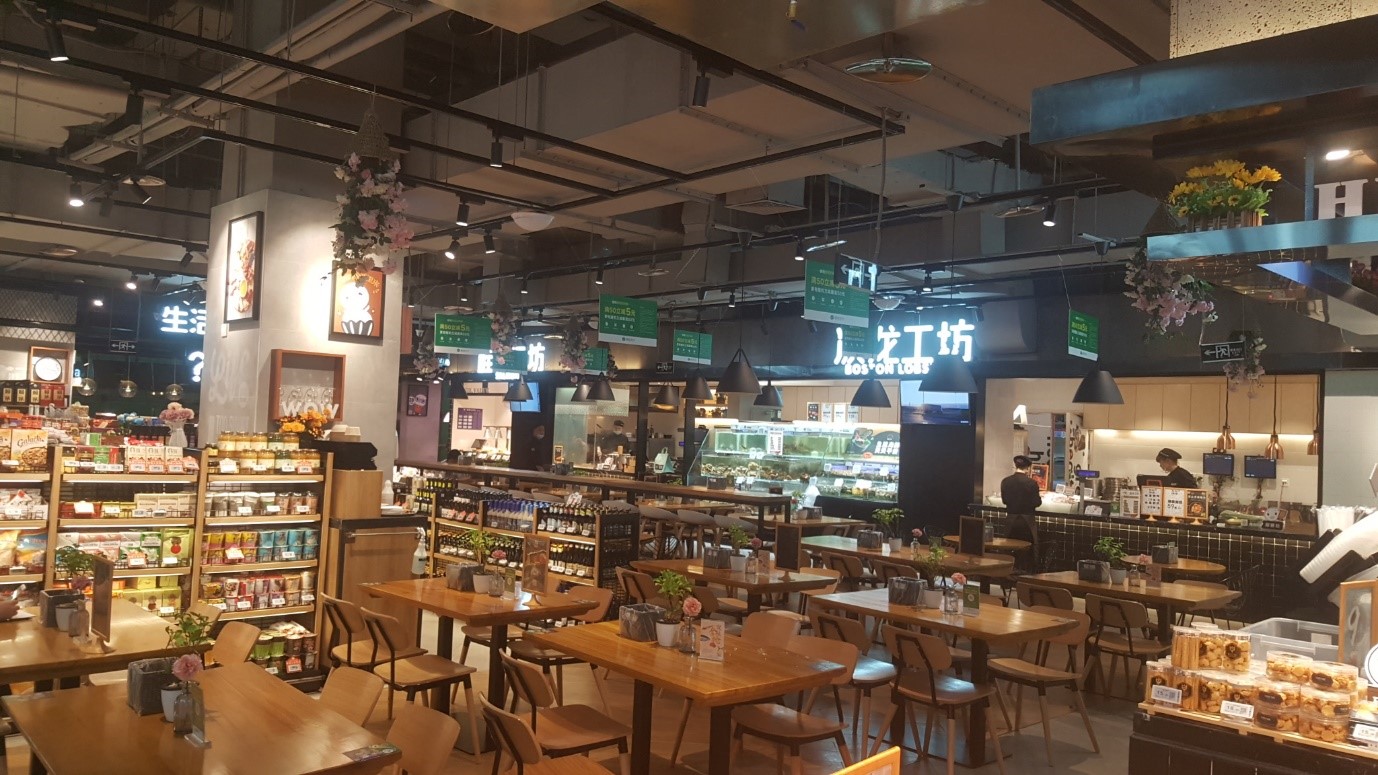Scaling Sustainability: How Corporations Can Amplify Eco-Innovation
Scaling Sustainability: How Corporations Can Amplify Eco-Innovation
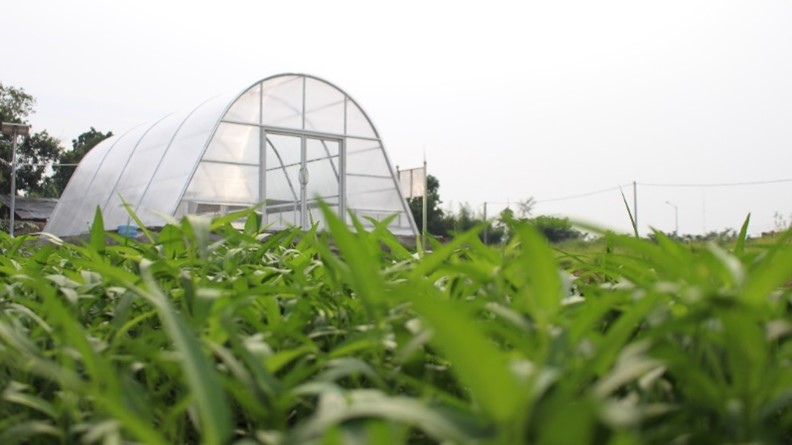

In an era where environmental consciousness is no longer optional but essential, global corporations are stepping up to embrace sustainability. Multinational brands like Adidas are leading the charge by integrating recycled materials into their products, demonstrating that eco-friendly practices can coexist with profitability and mass production. Adidas’s commitment to using recycled polyethylene terephthalate (rPET) in their footwear and apparel not only reduces plastic waste but also sets a precedent for other industry giants to follow.
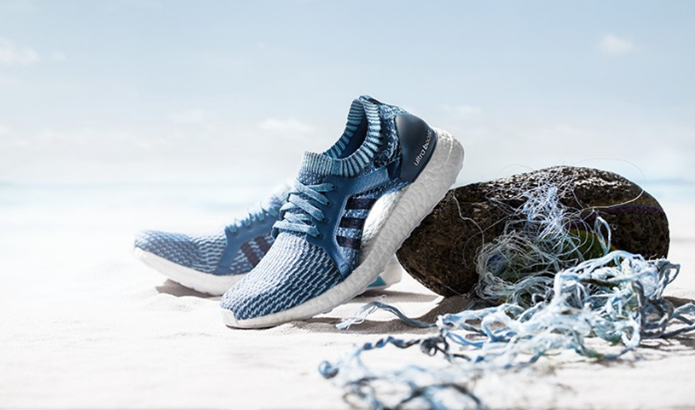
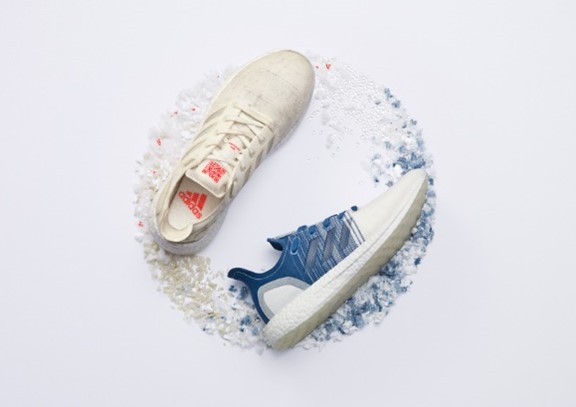
More than 96% of polyester used in Adidas products are recycled (left)
Adidas partners with Parley for the Oceans to repurpose ocean plastic waste for their shoes (right)
But what happens when smaller businesses adopt the same mindset? Can they scale sustainable efforts effectively while maintaining profitability? At Heyokha, we’ve been exploring this question and are inspired by companies that prove it’s possible. One such example is Impack Pratama (IMPC IJ), an Indonesian company revolutionizing the construction industry with innovative and sustainable solutions. IMPC’s approach to sustainability goes beyond profit—it’s rooted in addressing real-world challenges, empowering communities, and creating products that solve systemic issues.
Transforming Waste into Innovation
At the heart of IMPC’s sustainability push is its ability to turn waste into value. Instead of viewing plastic waste as a problem, the company sees an opportunity to create high-quality, durable products that reduce landfill contributions.
One of its latest innovations is a roofing product made entirely from 100% recycled plastic waste, set to launch this year, through its subsidiary PT Sirkular Karya Indonesia (SKI). This product provides a safer alternative to asbestos roofing, which remains widely used in Indonesia despite its well-documented health risks. Asbestos exposure is linked to fatal diseases such as mesothelioma, lung cancer, and asbestosis, causing over 200,000 deaths annually worldwide, according to the World Health Organization (WHO).
IMPC’s new roofing product not only addresses the asbestos crisis but also aligns with its broader commitment to integrating Environmental, Social, and Governance (ESG) principles into its business model. By repurposing plastic waste into durable, functional materials, IMPC is demonstrating how circular economy principles can be effectively implemented in the construction sector.
IMPC has taken a major step forward in sustainability through its partnership with Marubeni, a global conglomerate committed to environmental initiatives. Together, they are advancing plastic waste recycling by developing infrastructure to upcycle various types of plastic waste into new construction materials. This collaboration aims to significantly reduce landfill waste, promote resource efficiency, and create innovative solutions that serve both environmental and industrial needs.
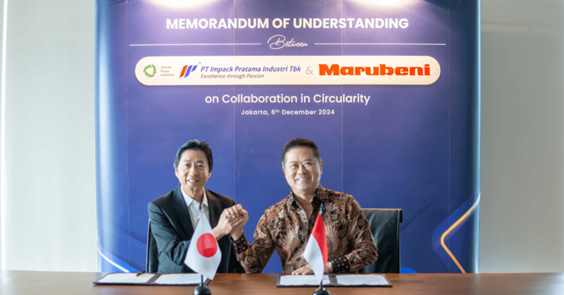
Marubeni Corporation signing MOU (memorandum of understanding) with IMPC through its subsidiary PT Sirkular Karya Indonesia (SKI) on December 6, 2024
By working with Marubeni, IMPC is scaling up recycling technology, ensuring that waste materials are not just discarded but transformed into valuable, reusable resources. This initiative reinforces the company’s mission to make sustainability a core component of industrial progress.
The Solar Dryer Dome: Boosting Livelihoods Sustainably
One standout example of IMPC’s commitment to sustainability is the Solar Dryer Dome (SDD), a joint project with Covestro, leading manufacturer of high-quality polymer materials. This innovative solution is designed to support rural farmers and fishermen by providing a cost-effective and efficient way to dry their produce. In tropical regions like Indonesia, where humidity often compromises the quality of harvested crops and fish, traditional drying methods are prone to spoilage and inefficiency.

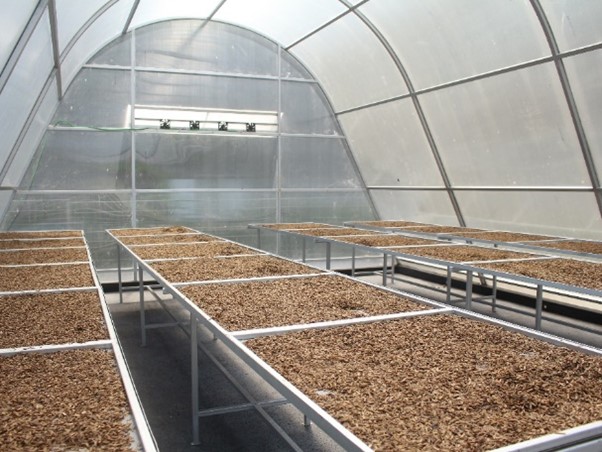
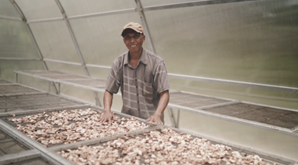
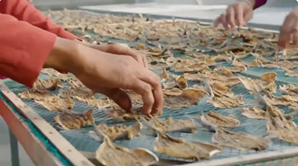
IMPC’s Solar Dryer Domes in action with farmers drying a variety of spices and fishes
IMPC’s Solar Dryer Dome addresses these challenges by leveraging solar energy to provide a controlled drying environment, significantly reducing wastage and improving productivity. Farmers and fishermen using the domes can increase their income as they preserve their produce better, fetch higher prices, and enter markets they couldn’t previously access due to hygiene and quality concerns.
Beyond supplying the domes, IMPC actively trains communities to use them effectively, teaching proper packaging methods that enhance product value and maintain hygiene. This hands-on approach fosters a sense of ownership and pride, ensuring that users maximize the benefits of the technology.
Sustainable Solutions Beyond Roofing
IMPC’s sustainability efforts extend beyond roofing. The company through its subsidiary, PT Sirkular Karya Indonesia (SKI), dedicated to creating eco-friendly building products, has developed several other eco-conscious products that redefine how plastic waste can be upcycled into valuable materials:
Ecolite & Alcotuff: Durable and Affordable Solutions
- Ecolite, a cost-effective clear roofing material, provides a practical alternative to polycarbonate, often used to cover drying areas and outdoor spaces. The product is made by going through an upcycling process using PET bottles.

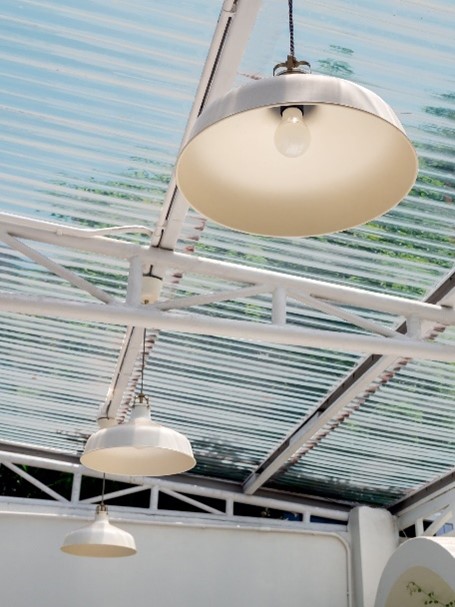
Ecolite roofing materials Ecolite in application
- Alcotuff, an Aluminum Composite Panel (ACP), is widely used in commercial building facades. What sets it apart? The core is made from upcycled plastic bags, layered between aluminum sheets to create a robust, lightweight structure.
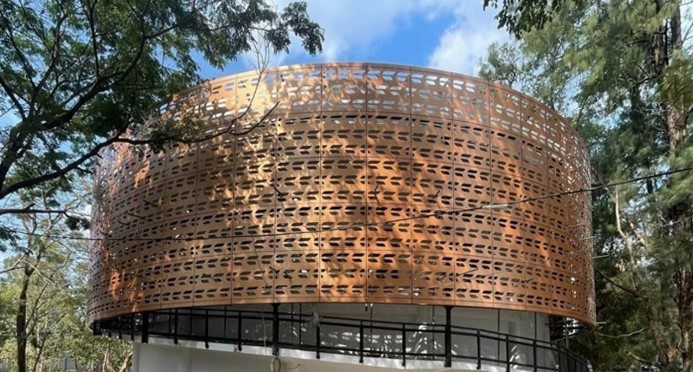
Alcotuff used at the Java Innovation Center and Gastronomy Park at Surakarta
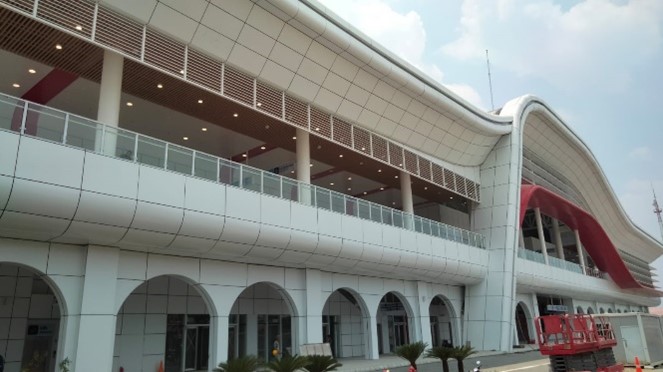
Alcotuff used at the Whoosh train station at Padalarang
By incorporating waste-derived materials into these products, IMPC not only reduces plastic pollution but also enhances the affordability and accessibility of construction solutions.
This initiative mirrors the efforts of global brands like Patagonia, which incorporates recycled materials into their outdoor gear, and Nike, which has introduced sustainable collections using recycled plastics. These companies illustrate how sustainability can be scaled, but SKI shows that even smaller businesses can develop products that meet ESG criteria without compromising on quality or profitability.
IMPC’s business model through SKI embraces a circular economy approach, ensuring that materials are recycled and reused within the product lifecycle. This strategy not only minimizes waste but also maximizes efficiency and cost-effectiveness, making sustainable practices financially viable.
Eco-Friendly Applications: Sustainable Innovation Meets Tradition
Another testament to IMPC’s sustainability vision is their eco-friendly Alderon and Adaron plafond, developed under Unipack Plasindo (UPC), an IMPC subsidiary. These ceiling products are designed to merge modern innovation with environmental responsibility. Constructed from recyclable uPVC material, these ceiling panels are not only durable and functional but also contribute to a circular economy by reducing waste.
One notable application of these plafonds can be seen in a mosque in Semarang, where they were used to enhance the interior while maintaining harmony with the building’s traditional architecture. The choice of recyclable materials aligns with the values of environmental stewardship while also addressing the growing demand for green construction materials.
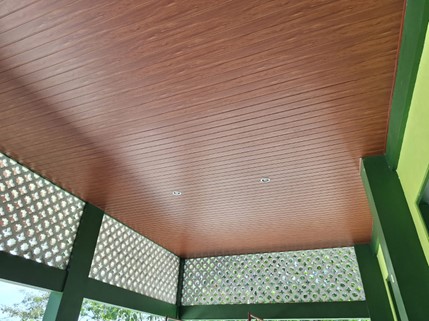
Alderon and Adaron ceiling products used at a mosque in Semarang
What makes this product remarkable is its scalability. While the initial use case might be in a single building, the potential for widespread adoption is vast, particularly in a country like Indonesia, where infrastructure development is accelerating. From urban projects to rural construction, IMPC’s plafonds represent a sustainable alternative that does not compromise on quality or design.
Scaling Impact: A Blueprint for Industrial Sustainability
IMPC’s Solar Dryer Dome, new roofing product, and eco-friendly plafond products illustrate that sustainability can be both impactful and scalable. They also highlight a critical lesson for businesses of all sizes: integrating environmental and social considerations into core operations doesn’t have to come at the expense of profitability. Instead, it can unlock new markets, drive innovation, and create value that extends far beyond financial metrics.
Looking forward, sustainability is not a journey that can be undertaken alone. The scalability of sustainable efforts hinges on the collective action of corporations, small businesses, communities, and governments. While global brands have the resources to set industry standards, companies like IMPC prove that meaningful change can come from any level of the business ecosystem.
At Heyokha, we are proud to spotlight companies like IMPC, whose groundbreaking work inspires change across industries. Their example reminds us that meaningful progress stems from collective efforts—be it a global brand like Adidas incorporating rPET into their products or a local company like IMPC revolutionizing the construction industry.
Sustainability isn’t just a corporate responsibility; it’s a necessary evolution that businesses of all scales must embrace. By investing in sustainable practices today, we pave the way for a future that prioritizes the well-being of people and the planet, ensuring prosperity for generations to come.
Let IMPC’s journey inspire businesses everywhere to ask: If they can do it, why can’t we? The path to a sustainable future is open to all who are willing to take the first step.
Tara Mulia
Admin heyokha
Share
In an era where environmental consciousness is no longer optional but essential, global corporations are stepping up to embrace sustainability. Multinational brands like Adidas are leading the charge by integrating recycled materials into their products, demonstrating that eco-friendly practices can coexist with profitability and mass production. Adidas’s commitment to using recycled polyethylene terephthalate (rPET) in their footwear and apparel not only reduces plastic waste but also sets a precedent for other industry giants to follow.


More than 96% of polyester used in Adidas products are recycled (left)
Adidas partners with Parley for the Oceans to repurpose ocean plastic waste for their shoes (right)
But what happens when smaller businesses adopt the same mindset? Can they scale sustainable efforts effectively while maintaining profitability? At Heyokha, we’ve been exploring this question and are inspired by companies that prove it’s possible. One such example is Impack Pratama (IMPC IJ), an Indonesian company revolutionizing the construction industry with innovative and sustainable solutions. IMPC’s approach to sustainability goes beyond profit—it’s rooted in addressing real-world challenges, empowering communities, and creating products that solve systemic issues.
Transforming Waste into Innovation
At the heart of IMPC’s sustainability push is its ability to turn waste into value. Instead of viewing plastic waste as a problem, the company sees an opportunity to create high-quality, durable products that reduce landfill contributions.
One of its latest innovations is a roofing product made entirely from 100% recycled plastic waste, set to launch this year, through its subsidiary PT Sirkular Karya Indonesia (SKI). This product provides a safer alternative to asbestos roofing, which remains widely used in Indonesia despite its well-documented health risks. Asbestos exposure is linked to fatal diseases such as mesothelioma, lung cancer, and asbestosis, causing over 200,000 deaths annually worldwide, according to the World Health Organization (WHO).
IMPC’s new roofing product not only addresses the asbestos crisis but also aligns with its broader commitment to integrating Environmental, Social, and Governance (ESG) principles into its business model. By repurposing plastic waste into durable, functional materials, IMPC is demonstrating how circular economy principles can be effectively implemented in the construction sector.
IMPC has taken a major step forward in sustainability through its partnership with Marubeni, a global conglomerate committed to environmental initiatives. Together, they are advancing plastic waste recycling by developing infrastructure to upcycle various types of plastic waste into new construction materials. This collaboration aims to significantly reduce landfill waste, promote resource efficiency, and create innovative solutions that serve both environmental and industrial needs.

Marubeni Corporation signing MOU (memorandum of understanding) with IMPC through its subsidiary PT Sirkular Karya Indonesia (SKI) on December 6, 2024
By working with Marubeni, IMPC is scaling up recycling technology, ensuring that waste materials are not just discarded but transformed into valuable, reusable resources. This initiative reinforces the company’s mission to make sustainability a core component of industrial progress.
The Solar Dryer Dome: Boosting Livelihoods Sustainably
One standout example of IMPC’s commitment to sustainability is the Solar Dryer Dome (SDD), a joint project with Covestro, leading manufacturer of high-quality polymer materials. This innovative solution is designed to support rural farmers and fishermen by providing a cost-effective and efficient way to dry their produce. In tropical regions like Indonesia, where humidity often compromises the quality of harvested crops and fish, traditional drying methods are prone to spoilage and inefficiency.




IMPC’s Solar Dryer Domes in action with farmers drying a variety of spices and fishes
IMPC’s Solar Dryer Dome addresses these challenges by leveraging solar energy to provide a controlled drying environment, significantly reducing wastage and improving productivity. Farmers and fishermen using the domes can increase their income as they preserve their produce better, fetch higher prices, and enter markets they couldn’t previously access due to hygiene and quality concerns.
Beyond supplying the domes, IMPC actively trains communities to use them effectively, teaching proper packaging methods that enhance product value and maintain hygiene. This hands-on approach fosters a sense of ownership and pride, ensuring that users maximize the benefits of the technology.
Sustainable Solutions Beyond Roofing
IMPC’s sustainability efforts extend beyond roofing. The company through its subsidiary, PT Sirkular Karya Indonesia (SKI), dedicated to creating eco-friendly building products, has developed several other eco-conscious products that redefine how plastic waste can be upcycled into valuable materials:
Ecolite & Alcotuff: Durable and Affordable Solutions
- Ecolite, a cost-effective clear roofing material, provides a practical alternative to polycarbonate, often used to cover drying areas and outdoor spaces. The product is made by going through an upcycling process using PET bottles.


Ecolite roofing materials Ecolite in application
- Alcotuff, an Aluminum Composite Panel (ACP), is widely used in commercial building facades. What sets it apart? The core is made from upcycled plastic bags, layered between aluminum sheets to create a robust, lightweight structure.

Alcotuff used at the Java Innovation Center and Gastronomy Park at Surakarta

Alcotuff used at the Whoosh train station at Padalarang
By incorporating waste-derived materials into these products, IMPC not only reduces plastic pollution but also enhances the affordability and accessibility of construction solutions.
This initiative mirrors the efforts of global brands like Patagonia, which incorporates recycled materials into their outdoor gear, and Nike, which has introduced sustainable collections using recycled plastics. These companies illustrate how sustainability can be scaled, but SKI shows that even smaller businesses can develop products that meet ESG criteria without compromising on quality or profitability.
IMPC’s business model through SKI embraces a circular economy approach, ensuring that materials are recycled and reused within the product lifecycle. This strategy not only minimizes waste but also maximizes efficiency and cost-effectiveness, making sustainable practices financially viable.
Eco-Friendly Applications: Sustainable Innovation Meets Tradition
Another testament to IMPC’s sustainability vision is their eco-friendly Alderon and Adaron plafond, developed under Unipack Plasindo (UPC), an IMPC subsidiary. These ceiling products are designed to merge modern innovation with environmental responsibility. Constructed from recyclable uPVC material, these ceiling panels are not only durable and functional but also contribute to a circular economy by reducing waste.
One notable application of these plafonds can be seen in a mosque in Semarang, where they were used to enhance the interior while maintaining harmony with the building’s traditional architecture. The choice of recyclable materials aligns with the values of environmental stewardship while also addressing the growing demand for green construction materials.

Alderon and Adaron ceiling products used at a mosque in Semarang
What makes this product remarkable is its scalability. While the initial use case might be in a single building, the potential for widespread adoption is vast, particularly in a country like Indonesia, where infrastructure development is accelerating. From urban projects to rural construction, IMPC’s plafonds represent a sustainable alternative that does not compromise on quality or design.
Scaling Impact: A Blueprint for Industrial Sustainability
IMPC’s Solar Dryer Dome, new roofing product, and eco-friendly plafond products illustrate that sustainability can be both impactful and scalable. They also highlight a critical lesson for businesses of all sizes: integrating environmental and social considerations into core operations doesn’t have to come at the expense of profitability. Instead, it can unlock new markets, drive innovation, and create value that extends far beyond financial metrics.
Looking forward, sustainability is not a journey that can be undertaken alone. The scalability of sustainable efforts hinges on the collective action of corporations, small businesses, communities, and governments. While global brands have the resources to set industry standards, companies like IMPC prove that meaningful change can come from any level of the business ecosystem.
At Heyokha, we are proud to spotlight companies like IMPC, whose groundbreaking work inspires change across industries. Their example reminds us that meaningful progress stems from collective efforts—be it a global brand like Adidas incorporating rPET into their products or a local company like IMPC revolutionizing the construction industry.
Sustainability isn’t just a corporate responsibility; it’s a necessary evolution that businesses of all scales must embrace. By investing in sustainable practices today, we pave the way for a future that prioritizes the well-being of people and the planet, ensuring prosperity for generations to come.
Let IMPC’s journey inspire businesses everywhere to ask: If they can do it, why can’t we? The path to a sustainable future is open to all who are willing to take the first step.
Tara Mulia
Admin heyokha
Share













